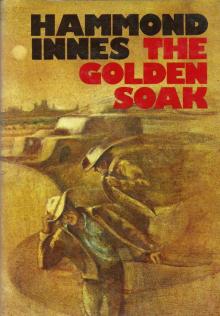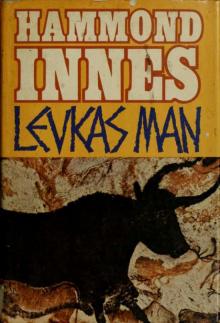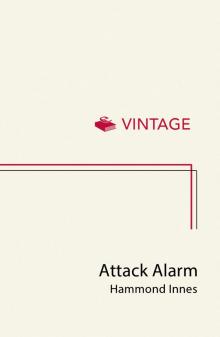- Home
- Hammond Innes
Air Bridge Page 5
Air Bridge Read online
Page 5
So that was it! Saeton had something new in engine design, something that would reduce fuel consumption. His wasn’t the first company that had come to grief trying to pursue this particular mirage, and yet the vibrance in his voice, the sheer gripping enthusiasm of the man carried conviction. I stared at Randall. Surely he would give Saeton those two months? I wanted to see those engines finished now. I wanted to see them in the air, to see them tested. If Saeton succeeded.…
But Randall was shaking his head. “I’m s-sorry, Bill.” He was stuttering now in his embarrassment. “I’m p-pretty well cleaned out, you know.”
“You mean you’ve lost so heavily you can’t buy those mortgages back?” Saeton was staring at him hard.
Randall nodded.
“But what about your horses, your car, that house down at Hatfield?”
The other stared at him. “But dash it,” he exclaimed. “I can’t sell the house. It’s been in the family for generations. And I won’t sell my horses.” His face was flushed and there was an obstinate look in his eyes. “I’m sorry, Bill,” he said again. “But you’ve had all the money you’re going to get out of me. My solicitor warned me against——”
“Oh, damn your solicitor!” Saeton shouted. “Can’t you understand that in two months’ time——” He didn’t finish. He had seen the obstinate look in Randall’s eyes and he turned away in disgust. His hand reached out and switched off the engine. The din gradually died away. Saeton’s hand tightened on the boss where the propeller would be fitted as he turned slowly and faced Reinbaum. “So it comes to this—we’re dealing direct with you, Mr. Reinbaum. Is that correct?” His voice was quiet and controlled.
Reinbaum beamed and bowed slightly.
“What are your terms for allowing us to continue with the fitting out of the plane?”
Reinbaum shook his head. “I’m sorry, Mr. Saeton. I do not speculate.”
“I’ve given you some idea of what we’re doing here,” Saeton said. “Surely we can come to some arrangement?”
“The offer I have for your plane and the equipment here is conditional on acceptance within forty-eight hours.” Reinbaum spread his hands in a little apologetic gesture. “Unless you can pay what is due on the mortgages I must foreclose.”
“You know damn well we can’t pay. In two months——”
“I want the money now, Mr. Saeton.” The softness was leaving Reinbaum’s voice.
“But if you wait two months …” Saeton’s voice was desperate. “Two months isn’t long. In two months’ time I’ll have all the backing——”
“I repeat, if you cannot pay what is due, then——” Reinbaum shrugged his shoulders.
Saeton turned away and in the light from the high windows I caught a glint of tears in his eyes. He went slowly over to the bench and stood there, fiddling with the armature he’d spent so many laborious hours winding, his back towards us.
“Well, I think that is settled then,” Reinbaum said, glancing up at Randall, whose face was stiff and wooden. “We had better go now, Major.”
In a flash I saw my refuge up here on this aerodrome disappearing. But it wasn’t only that. I believed in Saeton. I wanted to see these engines in the air. The money I had made ferrying planes and on currency deals wasn’t honest money. I didn’t care what happened to it. Probably it would be better if I threw it away and I might as well throw it away on this. “Just a moment,” I said as Reinbaum and Randall were turning away. “Is it one of the mortgages that has fallen due?”
Randall shook his head. “No. It’s the interest on them.”
“The interest on them?” I exclaimed. “How much?”
“Eleven hundred and fifty,” Randall murmured.
I turned to Saeton. “Can’t you raise that?” I said. “You could sell something.”
He shook his head. “There’s nothing here that isn’t essential,” he said dully. “If we sold any part of the equipment we couldn’t go on. Besides, it’s all mortgaged. Everything in this hangar is mortgaged.”
“But surely you’ve got some money of your own?” I persisted.
“Blast you!” he shouted, swinging round on me. “You don’t have to hammer the truth of this home to me. I don’t possess any money at all. For the past month we’ve lived on credit. My bank account is overdrawn to the tune of more than a hundred pounds. Carter is in the same boat. And don’t for God’s sake start asking me if I haven’t any friends. I haven’t any friends to the tune of eleven hundred quid.” He turned to Randall and Reinbaum. “Now get the hell out of here, the pair of you. Take what action you like.”
They turned to go.
“Just a minute,” I called to them. “The amount is eleven hundred and fifty?”
It was Reinbaum who answered. “The exact amount is eleven hundred and fifty-two pounds four shillings and sevenpence.”
“Then perhaps you would make me out a receipt,” I said. I had got my wallet out and was extracting my cheque book.
He stood there staring at me as though a pit had suddenly opened at his feet. “A receipt please, Mr. Reinbaum,” I repeated.
He came slowly towards me. “How do I know that your cheque will be honoured? I do not give a receipt——”
“You have the law to protect you in a case like that,” I said. “Can I see the documents proving that you are the legal possessor of these mortgages?” I was enjoying myself, enjoying the sudden surprised silence that descended on the hangar. Nobody spoke, and Reinbaum stared at me with baffled eyes. For some reason he didn’t want to be paid. I thought of how I had got that money and I was suddenly glad I’d ferried those planes. Somehow this made the racket worth while.
Saeton was the first to come to life. “Just a minute, Fraser. Apart from the fact that I can’t allow you to do this, it won’t help, you know. We owe money. Also we’ve got to be carried for two months.”
“I realise that,” I said. “What’s the absolute minimum that will carry you to the flying stage?”
He hesitated. “About another thousand.” His voice suddenly took on new life. “You see, we’ve got the metal and the castings. We’ve got everything. All we need is to cover some of the bills that’ll come in and our living——” His sudden excitement faded and his words stopped. “To carry us and pay the interest on these mortgages you’ve got to have nearly two thousand five hundred.”
I sat down and wrote out Reinbaum’s cheque. “Who shall I make it out to?” I asked him.
“Weiner, Reinbaum and Company,” he answered sullenly. As I entered the amount on the cheque counterfoil Saeton touched my shoulder. “Have you really got two thousand five hundred in your account?” he asked almost unbelievingly.
“Not in my account,” I answered. “But with my life policy I’m good for that much.”
He didn’t say anything, but his hand gripped my shoulder for a moment.
I checked the documents Reinbaum reluctantly produced from his brief-case. Then I gave him the cheque and got his receipt. All this time Saeton had been standing over us and as the little man straightened up, he said, “It was the engines you wanted, wasn’t it, Reinbaum?” There was a dangerous quietness about his voice.
“I do not want anything,” Reinbaum answered him. “Only the moneys.” But I don’t think he expected Saeton to believe him, for he added quickly, “My clients are interested in the charter business.”
“And who exactly are your clients?” Saeton asked in the same quiet voice.
“I am sorry. I cannot tell you that.”
Saeton took him gently by the collar. “It was the engines they wanted, wasn’t it? Somebody tipped them off that you held the mortgages.” He turned to Randall. “Had you borrowed on these mortgages when you were down here last, in October?” he asked.
“I’m not sure,” Randall answered unwillingly. “Possibly.”
“Did you mention it to anyone—Else, for instance?”
Randall flushed. “I may have done. I can’t remember. I——”
> “You tell a stray D.P. and you don’t tell me.” Saeton’s face was white with anger. “And you’re a director of my company. My God!” He picked little Reinbaum up by his collar with his two hands and shook him. “Who are these clients of yours?” he shouted, and I thought he’d break the little man apart.
Reinbaum’s spectacles fell to the ground. His plump white hand moved agitatedly with a flash of gold. “Please,” he cried. “I will have the police——”
“Oh, no you won’t.” Saeton laughed through his clenched teeth. “You’ve no friends here. They’ll all swear I never laid a finger on you. Now, then. Who are your clients?” He shook the man till he screamed and then he flung him away like a discarded sack. Reinbaum stumbled, caught his foot against a stool and went sprawling on to the dusty concrete. “Well?” Saeton demanded, standing over him.
The man was fumbling blindly for his glasses. Saeton kicked them over to him and then picked up the brief-case, searching through it, strewing the papers he discarded over the floor. He found what he wanted in the end, holding it up, his eyes darkening with anger as he read it. “My God!” he exclaimed. “So that’s it.” He stuffed the letter into the pocket of his jacket and stared down at Reinbaum. “How did they discover I’d got the prototype?” he demanded. “How did they know that?” He turned away as Reinbaum shook his head obstinately. “All right. It doesn’t matter.” He tossed the brief-case and the rest of the papers on to the man’s prostrate body. “Now, get out!”
Reinbaum seized hold of the case, bundled the documents into it and fled.
“Well, that’s that,” Saeton said. He was standing there in the centre of the hangar like a bull that has disposed of one matador and is glaring round in search of the next. His gaze fixed on Randall. “Do you realise what you’ve done? You bloody nearly——” His mouth clamped shut and he came steadily down the hangar. “You’re not fit to be a director of a company.” He stopped and Randall muttered inarticulate apologies. “Sit down,” Saeton said, his voice shaking with anger. “Now write me out a letter of resignation.”
“Suppose I refuse to resign?” Randall’s face was pale and though his head was turned towards Saeton his eyes slid away from him.
“Refuse to resign!” There were white patches under Saeton’s eyes. “Whilst we’ve been slaving our guts out up here to build something worth while, what have you been doing? Gambling. Gambling with the future of my company. Well, Carter and I aren’t working twenty-four hours a day to make a fortune for a man who has never done a thing to help us, who——”
“That’s not true,” Randall answered. “Who brought the thing out of Germany in the first place? You’d never have got it back here unless I’d smuggled it out in one of my vehicles. Who’s paid for all the development work? Every time you’ve asked for money——”
“It’s all covered by those mortgages,” Saeton cut in, his voice suddenly quiet. “You’ve never risked a penny, whilst Carter and I have sunk everything we had without security. The company owes you nothing, except a fee for smuggling the prototype out, and I’ll see you’re paid for that. As for the mortgages, it’s not my fault you’ve borrowed on them and gambled away the proceeds.” He paused for breath. “You’ve only yourself to blame, Dick,” he added, almost gently. He pulled a pen out of his pocket and pushed it into Randall’s hand. “I suggest ‘pressure of other business.’”
Randall hesitated. But Saeton was standing over him and there was something compelling in the quietness of the man, the whiteness of his face. Randall glanced up once and then the pen was scratching at the paper Carter had thrust in front of him.
As soon as Randall had signed it, Saeton took it from him, glanced at it quickly and then slipped it into his pocket. “And now for God’s sake get Reinbaum off the airfield before I murder the little bastard.”
Randall stood up, hesitating as he faced us. I thought for a moment he was going to say something, but the hostile silence was too much for him. He turned away and we watched him go, heard the door click shut, and then we were alone in the hangar. Saeton pulled out his handkerchief and mopped his face. “Christ!” he said. “I didn’t expect to come out of that with the company still intact.” His gaze came round to me. “About the luckiest thing I ever did was to tell you you could stay on up here.” He rubbed his hands and his voice was suddenly cheerful as he said, “Well, that leaves us short of the necessary three directors, Tubby. I suggest, therefore, as an acknowledgment of our gratitude to him for saving the company in its hour of need, we invite Mr. Fraser to join the board.” Relief had brought a hint of laughter to his voice. “Will you second that, Tubby?”
Carter glanced quickly across at me. I was conscious of a fractional hesitation, and then he said, “Yes. I second that.”
Saeton came over and clapped me on the shoulder. “You’re now a director of Saeton Aircraft Ltd., entitled to a yearly salary of £2,500.” He gave a quick laugh. “It’s never been paid yet.” And then he added, “But some day—soon now——” He stopped. His voice had become serious. “Fraser, I can’t thank you enough. God knows why you did it, but”—he gripped my hand—“I can’t tell you——” His voice broke off as though the words he sought were inadequate and he just stood there, wringing my hand. “Why did you do it, eh? Why?” He was suddenly laughing. “I can’t forget little Reinbaum’s face when you asked him for that receipt.” He laughed till the tears ran down his face. Then, with a quick change to brusqueness: “Well, why did you do it?”
“I don’t quite know,” I answered awkwardly. “I wanted to, that’s all.” I turned away, embarrassed by the sudden emotionalism in his voice.
There was a moment’s silence, and then he said abruptly, “Well, let’s get back to work.” The sense of purpose was back in his eyes now and it gave me an odd feeling of closeness to him as I went over to my lathe and picked up the half-completed piston.
But somehow I couldn’t concentrate. Randall’s words came between me and my work. I’d been caught out in a racket once and I didn’t want any more of it. If they were smuggling foreign patents….
I switched off the lathe and went over to Saeton. He was seated on a stool, working on the armature again with the fierce concentration of a man who holds the future in his hands. He looked up at me as I stood over him. “Well, what is it?” he asked impatiently.
“I want all the cards on the table,” I said. “I don’t like working in the dark—not any more.”
He stared at me, his jaw clamped shut, an angry frown creasing his forehead. I watched the thick hand resting on the bench slowly clench into a fist. His eyes had hardened and narrowed with the clenching of his hand. I was looking at the man who had hit me two nights ago in the woods on the edge of the airfield. “Well?”
I hesitated. But I had to know where I stood. The hours I had spent working at that lathe had given me a new sense of confidence in myself. “Come on, man, let’s have it,” he snapped. “What’s on your mind?”
“This aero engine of yours”—I nodded to the gleaming bulk standing against the wall on its wooden chocks—“you didn’t design it, did you?”
“So that’s it. You think I’ve filched somebody else’s design, do you?”
“I didn’t say that,” I answered, feeling suddenly uncertain under the cold anger of his gaze. “I simply want to know whether you designed it?”
“Of course I didn’t design it,” he snapped. “You’re not a fool. You know damn well I don’t know enough about engineering to design an aero engine.” He had risen slowly to his feet and was standing in what seemed to be a characteristic attitude, legs slightly straddled, head thrust forward. “I suppose, now you’ve bought your way into the thing, you think you’re entitled to throw your weight about.” The violence died out of him and in a milder tone he added, “If you must know, it’s a bit of wartime loot. One day I’ll tell you the whole story. But not now.”
“Who owns the patent?” I asked.
“I do,” he snapped. “The p
rototype was never completed. For a man in your position, you’ve a devilish sensitive conscience.” He sat down abruptly. “For God’s sake let’s get on. We’ve wasted enough time already.”
I had barely got back to my lathe when there was a knock at the door of the hangar. “See who it is, will you, Fraser,” Saeton said. “If it’s Randall I won’t talk to him.”
But it wasn’t Randall. It was Diana, and with her was a girl in a faded brown smock. I knew her at once. She was the girl who had been talking with Saeton in the hangar that first night I had come to Membury. She had recognised me, too, for she caught her breath and stared at me as though I were something unexpected, and her broad forehead contracted in a frown that gave her pleasant, quiet features a brooding look.
“She wants to see Bill,” Diana said.
I pulled open the door and they came in, the girl hesitating over the sill as though she feared a trap. Then she was walking down the hangar, her head erect, her shoulders squared.
Saeton looked up, saw her and jumped to his feet. “What the devil are you doing here?” His thick eyebrows were dragged down, his body tense.
The girl didn’t flinch. Her eyes roved quickly along the bench. They were wide, intelligent eyes, and they seemed to miss nothing. Finally they came to rest on the completed engine and their expression seemed to change, to soften.

 High Stand
High Stand The Doomed Oasis
The Doomed Oasis Golden Soak
Golden Soak Levkas Man (Mystery)
Levkas Man (Mystery) The Strange Land
The Strange Land Dead and Alive
Dead and Alive Attack Alarm
Attack Alarm The Strode Venturer
The Strode Venturer Campbell's Kingdom
Campbell's Kingdom North Star
North Star The Wreck of the Mary Deare
The Wreck of the Mary Deare The Lonely Skier
The Lonely Skier The Black Tide
The Black Tide The Trojan Horse
The Trojan Horse Medusa
Medusa Air Bridge
Air Bridge Maddon's Rock
Maddon's Rock The Angry Mountain
The Angry Mountain Wreckers Must Breathe
Wreckers Must Breathe Solomons Seal
Solomons Seal The White South
The White South